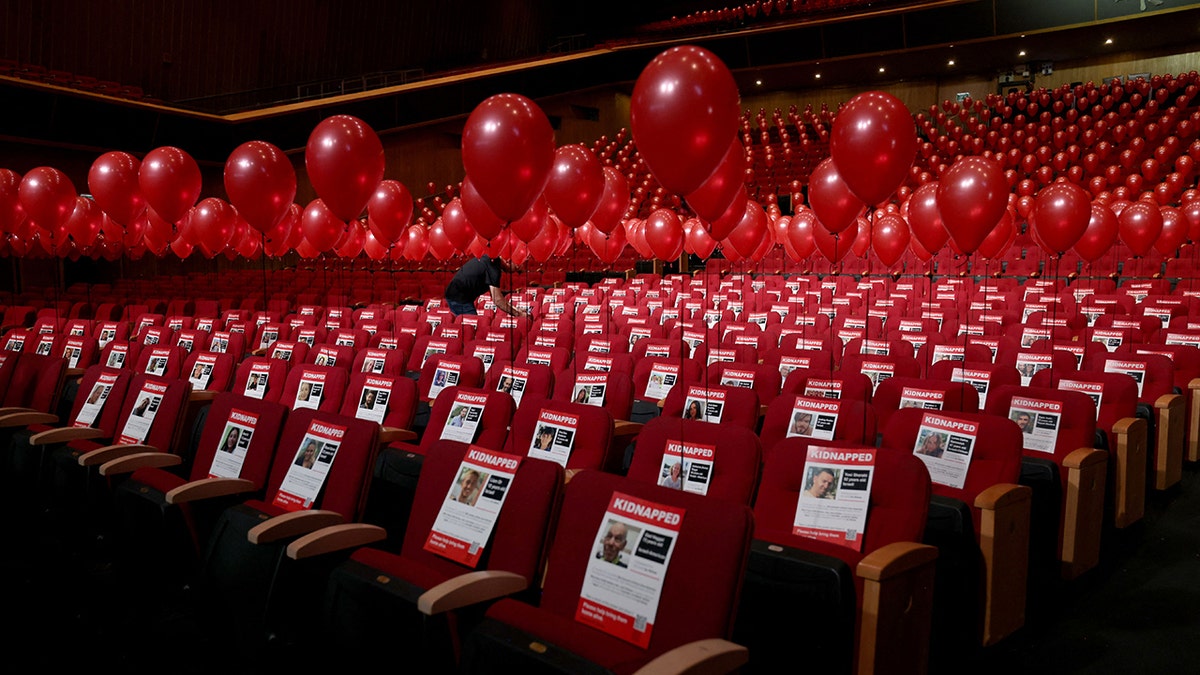
On October 7, life for my family stopped, and I don’t know when it will begin again. The civilized world is rightly horrified by the unspeakable brutality of the atrocities committed by Hamas. It is hard for me to believe, let alone write these words, but October 7 happened to us. My parents, Keith and Aviva Siegel, were kidnapped from their home and are now hostages in Gaza.
Because my parents can’t speak for themselves, as their daughter, I want the world to know who they are. I want the world to know that they believe that love for humanity will defeat hatred. I want the world to know that time is running out to prove them right and secure their release.
My father was born in the United States, while my mother grew up in South Africa. They moved to Kibbutz Kfar Aza more than 40 years ago, falling in love with this beautiful part of the world. There, they built a wonderful home for our family. In my mind, that home is a haven of love, comfort and happiness.
But it was shattered on October 7 when terrorists invaded. They forced my parents, unassuming people filled with kindness and a quiet sensitivity, into my father’s car and took them to Gaza. We don’t know where they were taken. We have no idea what condition they might be in. We have heard nothing from them or about them since they were kidnapped.
Eventually, we had to tell their five young grandchildren. We held hands in a circle and my sister (an American citizen like myself and our father) tried to explain where grandma and grandpa have gone. But how do you explain to children that monsters really do exist? Each day, they ask when their grandparents are coming home. I just hope that my parents are together, so that they too can hold each other’s hands just like we did.
These are the raw, heartbreaking facts of how my parents became hostages. But they are not just captives, they are my mother and father. I want the world to know that, above all, they believe that a person is a person. Whether Israeli or Palestinian, Jew or Muslim.
My father worked with many doctors, my mother worked with children. Both worked with Jews and Arabs and treasured them all equally. They lived and loved coexistence. My parents have an innate faith in the goodness of humankind. That is why, even after living through decades of conflict, they believe that peace can be reality. I hope that they still do.
My parents have a clear sense of right and wrong. Their worldview can be summed up in the conviction that love of humanity will always defeat hatred. They may have had their freedom taken away from them, but I won’t allow their beliefs to be taken away, too. Not only because they are the essence of my upbringing. But because these are the principles upon which the world must now act.
My parents’ faith in the world is founded on the assumption that world leaders are driven to do good. Countless times I remember them talking in admiration about global figures, because of the positive change they brought to the world.
In these desperate times, I cling to the hope that my parents were right. I so desperately want their faith in humanity to be repaid. They would assume that securing the freedom of innocent civilians – among them babies, children, women and the elderly – would surely top the global agenda. Any other calculation would be inconceivable to my parents.
At the end of the day, the story of Keith and Aviva Siegel isn’t just another sad story. Their fate and that of the other approximately 240 hostages, with more than 30 different citizenships, is at the heart of the war in Gaza. Their continued entrapment encapsulates the evil that engulfed Israel’s south on October 7.
Tragically, the 1,200 souls who were lost on that dreadful day couldn’t be saved. But the hostages can and must be brought home. Doing so would prove my parents right, that love of humanity will always defeat hatred. This fundamental belief, shared by all decent people, is what is at stake.
Calling for the hostages to be freed is not a political act. Rather, it is a supreme humanitarian demand. I know that war inevitably brings incredible suffering. My family is experiencing it firsthand. I am sure that for many this same sad truth is motivating calls for a ceasefire, including from the world leaders my parents admire so much. Yet, time and again, when talking about the conditions to end the fighting, those very same people fail to even mention the 240 hostages in Gaza.
It should never need repeating, but innocent civilians like my parents are not legitimate pawns of war. For leaders in Washington and beyond, placing the hostages’ fate front and center is a test of morality.
Demanding their freedom is to share the values of my parents, of everything that is good in the world. Quite simply, standing with the hostages now and in the days ahead means standing on the right side of history.

On October 7, life for my family stopped, and I don’t know when it will begin again. The civilized world is rightly horrified by the unspeakable brutality of the atrocities committed by Hamas. It is hard for me to believe, let alone write these words, but October 7 happened to us. My parents, Keith and Aviva Siegel, were kidnapped from their home and are now hostages in Gaza.
Because my parents can’t speak for themselves, as their daughter, I want the world to know who they are. I want the world to know that they believe that love for humanity will defeat hatred. I want the world to know that time is running out to prove them right and secure their release.
My father was born in the United States, while my mother grew up in South Africa. They moved to Kibbutz Kfar Aza more than 40 years ago, falling in love with this beautiful part of the world. There, they built a wonderful home for our family. In my mind, that home is a haven of love, comfort and happiness.
But it was shattered on October 7 when terrorists invaded. They forced my parents, unassuming people filled with kindness and a quiet sensitivity, into my father’s car and took them to Gaza. We don’t know where they were taken. We have no idea what condition they might be in. We have heard nothing from them or about them since they were kidnapped.
Eventually, we had to tell their five young grandchildren. We held hands in a circle and my sister (an American citizen like myself and our father) tried to explain where grandma and grandpa have gone. But how do you explain to children that monsters really do exist? Each day, they ask when their grandparents are coming home. I just hope that my parents are together, so that they too can hold each other’s hands just like we did.
These are the raw, heartbreaking facts of how my parents became hostages. But they are not just captives, they are my mother and father. I want the world to know that, above all, they believe that a person is a person. Whether Israeli or Palestinian, Jew or Muslim.
My father worked with many doctors, my mother worked with children. Both worked with Jews and Arabs and treasured them all equally. They lived and loved coexistence. My parents have an innate faith in the goodness of humankind. That is why, even after living through decades of conflict, they believe that peace can be reality. I hope that they still do.
My parents have a clear sense of right and wrong. Their worldview can be summed up in the conviction that love of humanity will always defeat hatred. They may have had their freedom taken away from them, but I won’t allow their beliefs to be taken away, too. Not only because they are the essence of my upbringing. But because these are the principles upon which the world must now act.
My parents’ faith in the world is founded on the assumption that world leaders are driven to do good. Countless times I remember them talking in admiration about global figures, because of the positive change they brought to the world.
In these desperate times, I cling to the hope that my parents were right. I so desperately want their faith in humanity to be repaid. They would assume that securing the freedom of innocent civilians – among them babies, children, women and the elderly – would surely top the global agenda. Any other calculation would be inconceivable to my parents.
At the end of the day, the story of Keith and Aviva Siegel isn’t just another sad story. Their fate and that of the other approximately 240 hostages, with more than 30 different citizenships, is at the heart of the war in Gaza. Their continued entrapment encapsulates the evil that engulfed Israel’s south on October 7.
Tragically, the 1,200 souls who were lost on that dreadful day couldn’t be saved. But the hostages can and must be brought home. Doing so would prove my parents right, that love of humanity will always defeat hatred. This fundamental belief, shared by all decent people, is what is at stake.
Calling for the hostages to be freed is not a political act. Rather, it is a supreme humanitarian demand. I know that war inevitably brings incredible suffering. My family is experiencing it firsthand. I am sure that for many this same sad truth is motivating calls for a ceasefire, including from the world leaders my parents admire so much. Yet, time and again, when talking about the conditions to end the fighting, those very same people fail to even mention the 240 hostages in Gaza.
It should never need repeating, but innocent civilians like my parents are not legitimate pawns of war. For leaders in Washington and beyond, placing the hostages’ fate front and center is a test of morality.
Demanding their freedom is to share the values of my parents, of everything that is good in the world. Quite simply, standing with the hostages now and in the days ahead means standing on the right side of history.














